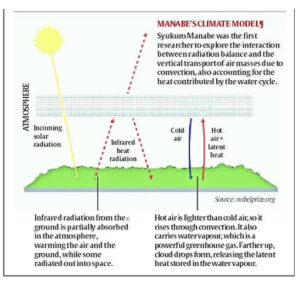In news- Syukuro Manabe of Japan from Princeton University, USA, Klaus Hasselmann of the Max Planck Institute for Meteorology in Germany, and Giorgio Parisi of the Sapienza University of Rome were awarded the Nobel Prize for Physics.
About their contributions-
- Syukuro Manabe (90) and Klaus Hasselmann (89) were cited for their work in “the physical modeling of Earth’s climate, quantifying variability and reliably predicting global warming”.
- The second half of the prize was awarded to Giorgio Parisi (73) for “the discovery of the interplay of disorder and fluctuations in physical systems from atomic to planetary scales.”
- Starting in the 1960s, Mr. Manabe developed a climate model that demonstrated how increases in the amount of carbon dioxide in the atmosphere would increase global temperatures, laying the foundations for current climate models.
- Later, Mr. Hasselmann created a model that linked weather and climate, helping explain why climate models can be reliable despite the seemingly chaotic nature of the weather.
- He also developed ways to look for specific signs of human influence on the climate.
- Mr. Parisi “built a deep physical and mathematical model” that made it possible to understand complex systems in fields as different as mathematics, biology, neuroscience and machine learning.

Though others have received Nobel Prizes for their work on climate change, including former U.S. Vice President Al Gore, this is the first time the Physics prize has been awarded specifically to a climate scientist.
















